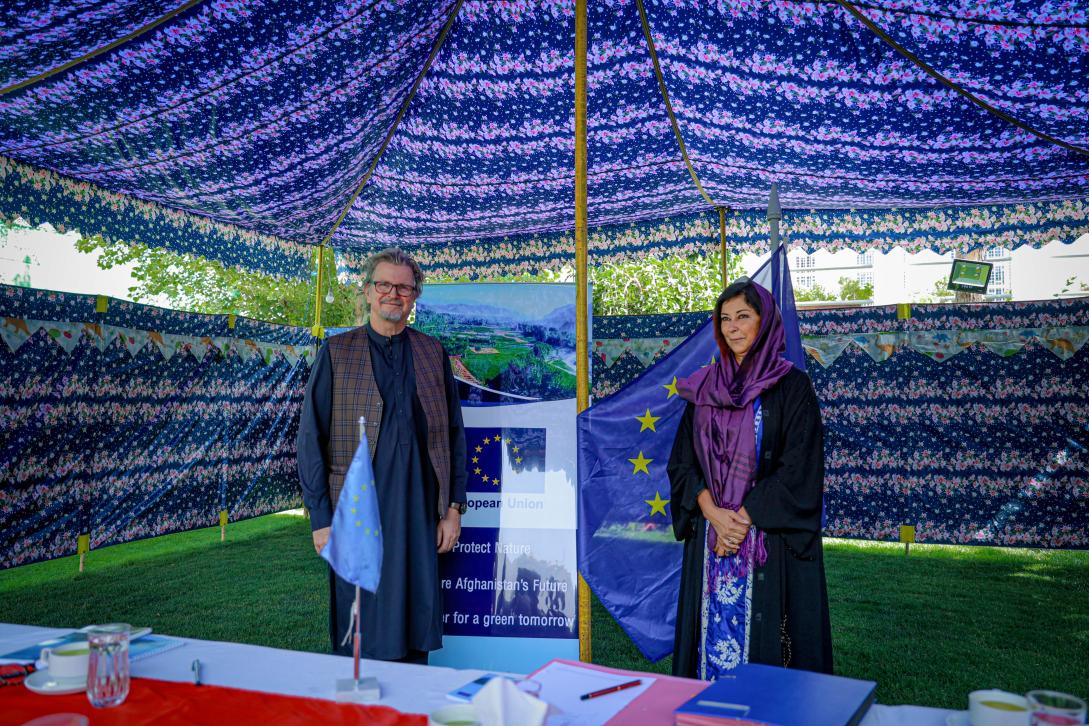The EU and the Norwegian Afghanistan Committee help protect Afghans from the impact of climate change

The European Union is providing more than EUR 3.3 million (an equivalent to 278 million Afghani) to the Norwegian Afghanistan Committee over a period of three years to enhance the capacity of local communities to adapt to climate change through a broad array of interventions in seven provinces across the country.
The action will improve civil society’s capacity to support communities in adapting to the impacts of climate change through climate-smart agriculture, livelihood diversification and efficient and sustainable natural resource management. Furthermore, the action will strengthen the knowledge base and participatory research related to climate change and sustainable resource management.
On the occasion of today's launch event, EU Chargée d’Affaires a.i., Raffaella Iodice said: “Climate change poses significant challenges to vulnerable communities around the world, and Afghanistan is no exception. Supporting local communities prepare and adapt to the impacts of climate change is essential for their resilience and well-being. Jointly with the Norwegian Afghanistan Committee, we help prepare Afghans in the best possible ways to better withstand these effects”.
The NAC Country Director, Terje Magnussønn Watterdal said: “Involving both women and men, youth, and grassroots civil society is essential for enabling communities in adapting to the impacts of climate change. The joint action between the EU and NAC will be important contribution in raising awareness within rural and hard-to-reach communities and building resilience.”
Starting on 15 September, 8 100 households with some 75 000 household members are expected to benefit from the action that covers Badakhshan, Daikundi, Faryab, Ghazni, Kapisa, Paktia and Takhar provinces.
By the end of the three-year project, civil society organisations will have been empowered and enabled to support Afghan farmers in rural and hard-to reach communities, ensuring that farmers are less affected by food shortages, an increased income and greater resilience to the impacts of climate change.
BACKGROUND
Afghanistan is one of the world’s most vulnerable countries to climate change, and one of the least prepared for these effects. Climate adaptation and resilience involves putting in place local structures and protective infrastructure that can not only ensure the harvest, but also contribute to saving water, replenishing ground water and mitigate erosion and prevent road destruction in rural areas. In other words, the gains on the community level from adaptation and resilience building interventions are significant.
ABOUT THE NORWEGIAN AFGHANISTAN COMMITTEE
Founded in 1980, the Norwegian Afghanistan Committee (NAC) is a member-based solidarity organisation with activities in Norway and Afghanistan. NAC runs programs within food security and natural resource management, health, and education in 14 of Afghanistan’s provinces. All NAC programs and initiatives are community driven, and dialogue and conflict transformation, gender equality, and anti-corruption are mainstreamed. NAC’s headquarters are in Oslo. The program activities in Afghanistan are led from Kabul, with regional offices in Badakhshan, Daikundi, Faryab, Ghazni, and Paktia, as well as project offices for in Balkh, Kapisa, Khost, Nangarhar and Paktika.
